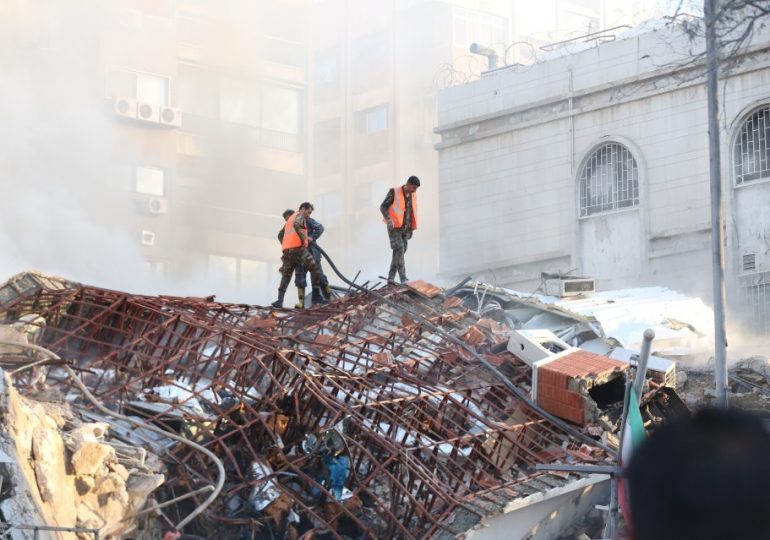IRANIAN leader Ebrahim Rasi has vowed a deadly airstrike on its consulate in Syria “will not go answered”.
At least seven officers including one of Tehran’s top generals were killed after suspected Israeli warplanes bombed the consulate in the Syrian capital Damascus.
EPARescue workers at the site of the airstrike in Damascus, Syria[/caption]
IRGCOne of Iran’s top generals Mohammad Reza Zahedi was killed in the blast[/caption]
RexSmoke rises after an attack on the building of the Iranian Consulate in Syria[/caption]
Israel has repeatedly targeted installations in Syria and those of its proxies.
But Monday’s attack was the first time it apparently hit the vast embassy compound itself.
Iranian state television branded the strike an “assassination attempt” against its ambassador, who survived.
Tehran has now insisted it is plotting a retaliation after its Supreme National Security Council, a key decision-making body, met late Monday.
President Ebrahim Rasi labelled the attack a “cowardly crime” as he pointed the finger of blame at Israel.
He said: “Having failed to destroy the will of the resistance front, the Zionist regime has put blind assassinations back on its agenda to save itself.
“It must know that it will never achieve its goals and that this cowardly crime will not go unanswered.”
It has left the Middle East on a knife-edge amid fears there will be further bloodshed in the region.
Gen. Mohammad Reza Zahedi, who led the elite Quds Force in Lebanon and Syria, was killed alongside his deputy Gen. Mohammad Hadi Hajriahimi, and five other officers.
Hezbollah said Tuesday that Zahedi played a crucial role in helping develop and advance the work of the group in Lebanon.
Zahedi was sanctioned by the UK and US.
The US Treasury said he acted as a “liaison” to Hezbollah and Syrian intelligence services.
It is understood he was charged with guaranteeing weapons shipments to Hezbollah.
Hezbollah said: “This crime will certainly not pass without the enemy receiving punishment and revenge.”
It is not clear whether Iran will respond itself, risking a dangerous confrontation with Israel and its ally the US, or if it will continue to rely on proxies, including Hezbollah militia and Yemen’s Houthi rebels.
Since the outbreak of the war in Gaza nearly six months ago, those proxies have stepped up attacks, leading to near-daily cross-border exchanges between Hezbollah and Israel.
Frequent Houthi attacks have also plagued Red Sea shipping.
Hamas, which rules Gaza and attacked Israel on October 7, is also backed by Iran.
Israel, which rarely acknowledges strikes against Iranian targets, said it had no comment on the latest attack in Syria.
Israel has grown increasingly impatient with the daily exchanges of fire with Hezbollah, which have escalated in recent days, and warned of the possibility of a full-fledged war.
Houthi rebels have also been launching long-range missiles toward Israel, including on Monday.
The history of Israel and Iran’s relationship
There’s been an ongoing conflict between Israel (left) and Iran (right).
In 1947, Iran was among 13 countries that voted against the United Nations Partition Plan for the British Mandate of Palestine.
Two years later, Iran also voted against Israel’s admission to the United Nations.
After the 1979 Islamic Revolution, Iran severed all diplomatic and commercial ties with Israel, and its theocratic government does not recognize the legitimacy of Israel as a state.
The turn from cold peace to open hostility began in the early 1990s, shortly after the collapse of the Soviet Union and the defeat of Iraq in the Gulf War, after which relative power in the Middle East shifted to Iran and Israel.
CONFLICT ‘HEATS UP’
The conflict escalated in the early 1990s, as Yitzhak Rabin’s government adopted a more aggressive posture on Iran.
Rhetorical conflict heated up during the presidency of Mahmoud Ahmadinejad, who made inflammatory statements against Israel.
Other factors that have contributed to the escalation of bilateral tensions include Iran’s development of nuclear technology relative to Israel’s long-stated Begin Doctrine, Iran’s funding of Islamist groups such as Hezbollah, Palestinian Islamic Jihad and Hamas, as well as alleged involvement in terrorist attacks such as the 1992 attack on Israeli embassy in Buenos Aires and the 1994 AMIA bombing, and Israel’s alleged support for militant groups such as the People’s Mujahedin of Iran and Jundallah as well as alleged covert Israeli operations in Iran including multiple assassinations and bombings.
‘COMPLEX AND ONGOING’
Since 1985, Iran and Israel have been engaged in an ongoing proxy conflict that has greatly affected the geopolitics of the Middle East, and has included direct military confrontations between Iranian and Israeli organizations, such as in the 2006 Lebanon War.
The conflict has played out in various ways, including through support for opposing factions in conflicts in Syria and Yemen.
Iran has provided support to the Syrian government, while Israel has supported opposition groups.
In Yemen, Iran has provided support to the Houthi rebels, while Israel has provided support to the Saudi-led coalition fighting the rebels.
The conflict has also involved cyber attacks and sabotage against each other’s infrastructure, including attacks on nuclear facilities and oil tankers.
Overall, the Iran-Israel proxy conflict is a complex and ongoing conflict that has had a significant impact on the political and security dynamics of the Middle East.
INSIDE THE WAR
In the Israeli–Lebanese conflict, Iran has supported Lebanese Shia militias, most notably Hezbollah. In the Israeli-Palestinian conflict, Iran has backed Palestinian groups such as Hamas.
Israel has supported Iranian rebels, such as the People’s Mujahedin of Iran, conducted airstrikes against Iranian allies in Syria and assassinated Iranian nuclear scientists. In 2018 Israeli forces directly attacked Iranian forces in Syria.
Iranian Islamists have long championed the Palestinian people, whom they perceive as “oppressed”.
Scholars believe that by supporting the Palestinians, Iran seeks greater acceptance among Sunnis and Arabs, both of whom dominate the Middle East.
Ideologically, Iran seeks to replace Israel with a one-state solution and has predicted Israel’s demise. Israel sees Iran as an existential threat, and accuses its regime of harboring genocidal intentions.
Consequently, Israel has sought sanctions and military action against Iran to stop it from acquiring nuclear weapons.
RexPeople gather at the site of the blast in Damascus[/caption]
Leave a comment







